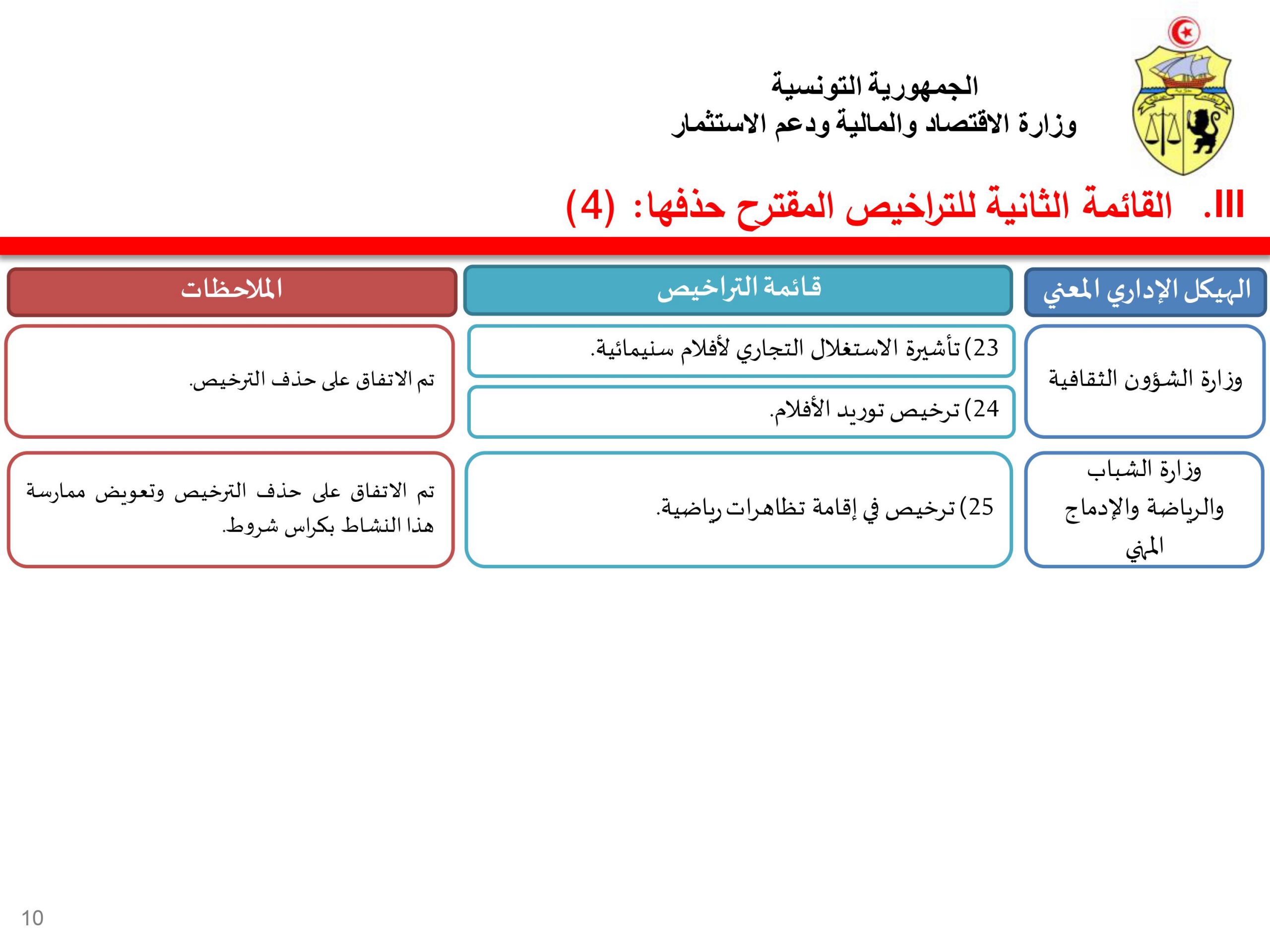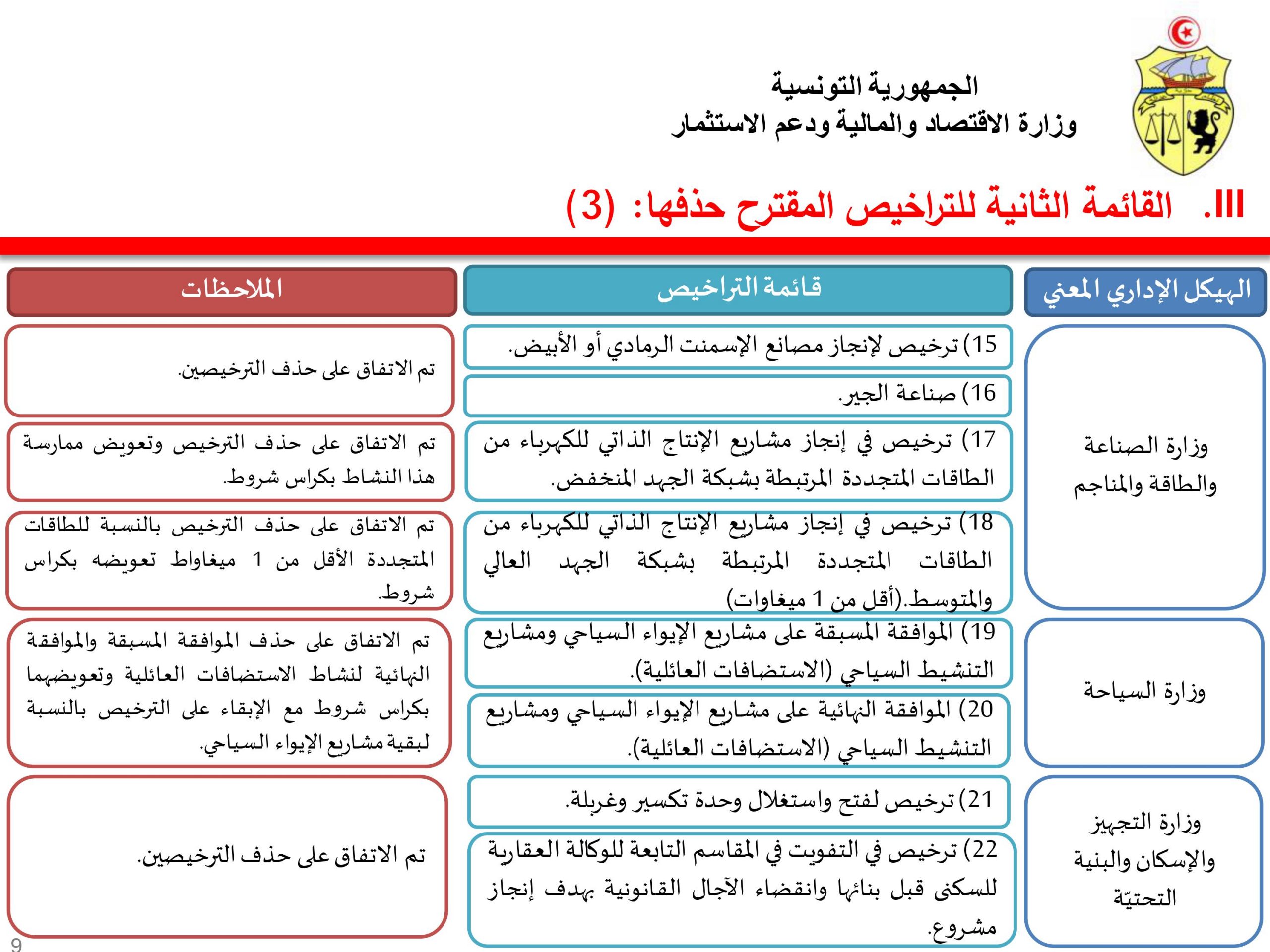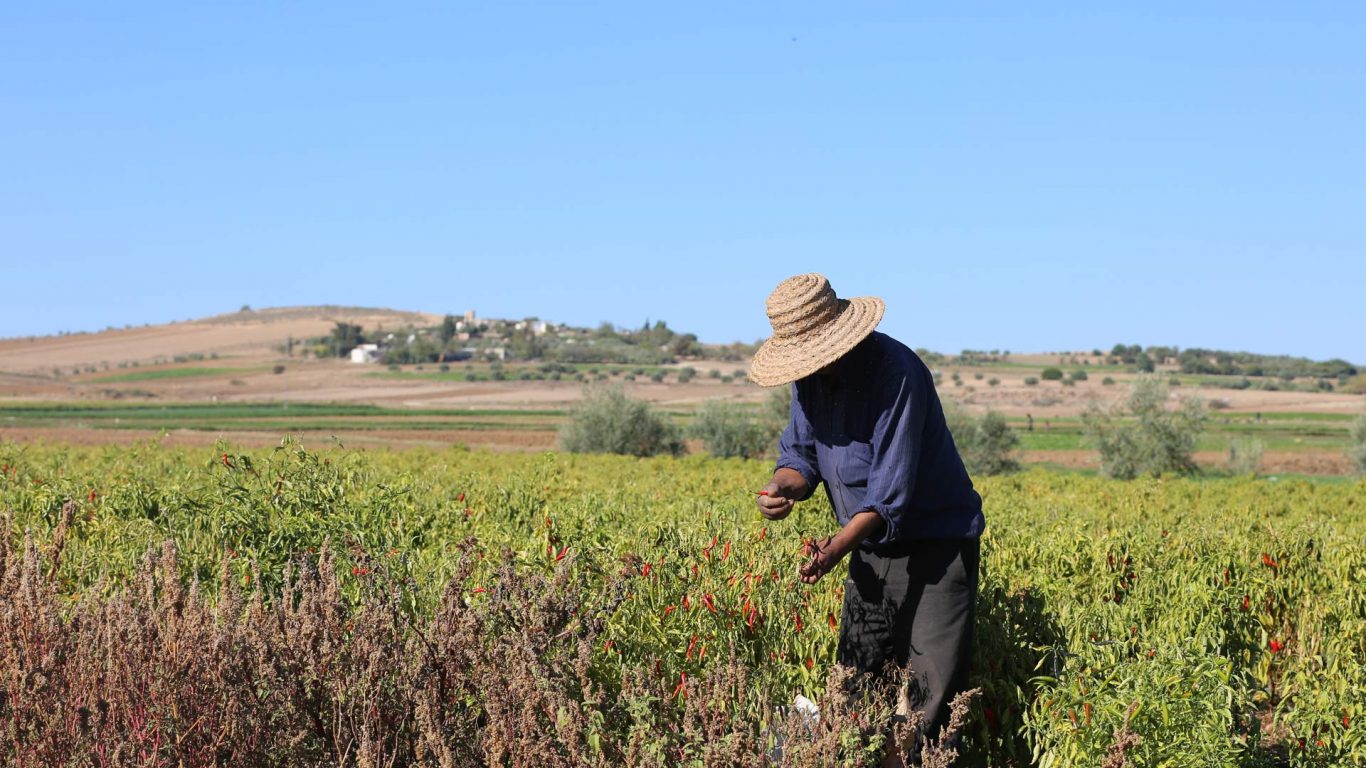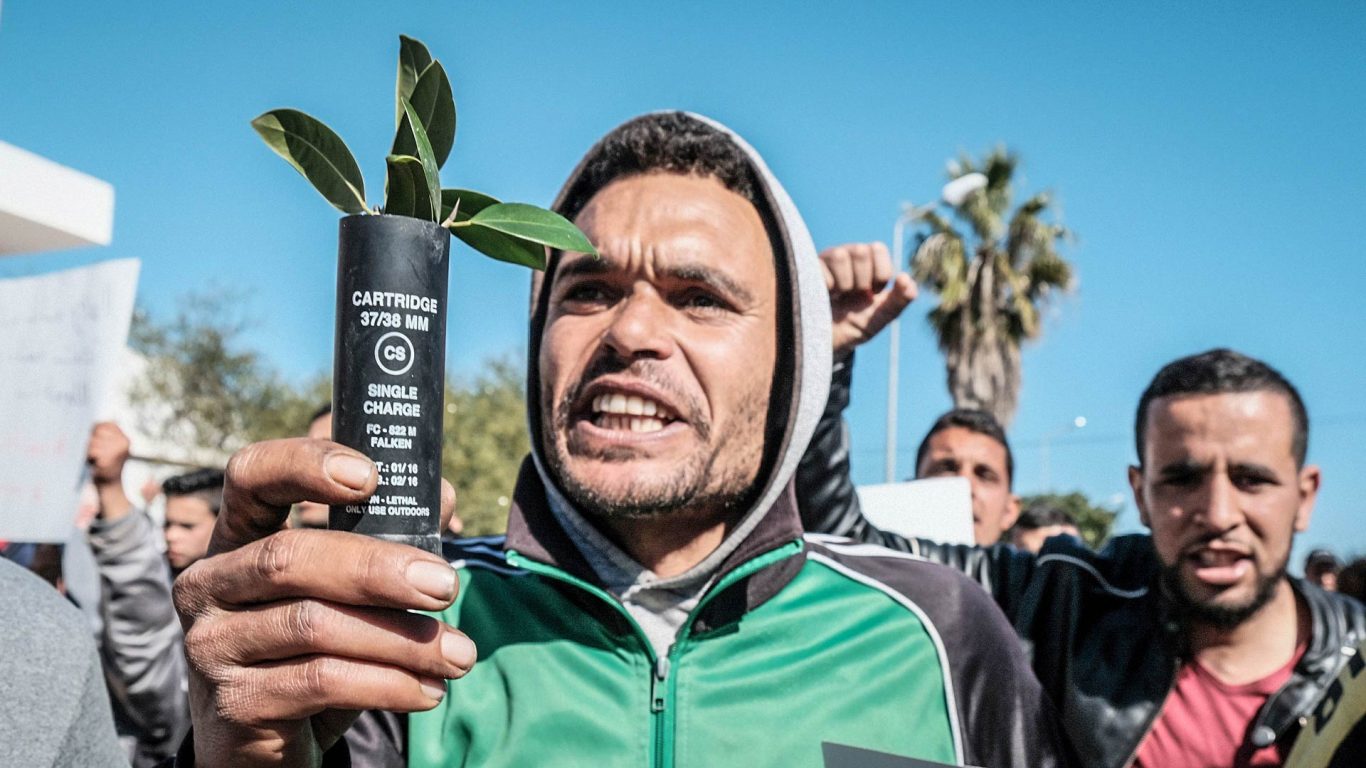On the same subject
But after doing some research, the association's members were soon disappointed. According to them, the government had in fact merely selected a handful of permits, far from being crucial to the economy. According to the information obtained by inkyfada, this was done with the endorsement of the European Union, which will provide 60 million euros in budgetary support by the end of the year, providing that the announcement is implemented through a decree.
A numbers Race
The permits that are to be abolished or eased span 14 different activities. "If the government's intentions were honest, it would not have gone about inflating the numbers in this way", deplores Dhia Khalfallah, member of ALERT. To reach the total of 27, the government has redoubled its ingenuity, he explains: merging two permits into one, counting permits relating to the same activity twice, or even lifting permits inherited from the Ben Ali era, the abolition of which is above all symbolic.
The permits to be abolished or replaced span 14 economic sectors, including the permit abolition of 3 polluting or hazardous activities. Source: Internal document of the Ministry of Finance, Economy and Investment, dated June 17, 2021, specifying the draft reform of permits.
7 permits will be permanently abolished. Among them are three permits concerning activities classified as "hazardous or polluting", and are therefore less likely to be monitored in the future. According to Dhia Khalfallah, this decision is illogical: "For certain minor activities, you will have to think twice, fulfil the requirements etc. However, in the cement industry you can go ahead, there is no problem: you can pollute the environment, and over-exploit the electricity infrastructure!"
16 other permits will be replaced by specifications. This is, in theory, a different type of regulation, but in practice it works similarly to permits, that is with conditions to be fulfilled that are often very complex. It even frequently happens that a permit is required within a specification, as confirmed by ALERT members and several specifications that were consulted by inkyfada.
According to Elyès Jouini, university professor in economics, for a real change to be observed, "the specifications must not set up conditions that are just as strict as for the permits. There has to be monitoring after the activity has started, and a statistical monitoring, i.e. we must not prevent the actors from working even if we haven't monitored them. Otherwise we would be reverting to the old system."
BEING A MODEL STUDENT TO THE EU
The European Union is involved in the permit reform project and is expected to provide tens of millions of euros in budgetary support to Tunisia between 2021 and 2022 under the Economic Governance Support Programme (PAGE).
The disbursement of the 60 million euros that is planned for 2021 will only take place if Tunisia formalises the abolition of the permits through a decree, says Sophie Vanhaeverbeke, head of coordination of the European Union delegation in Tunisia, whilst also specifying that three other conditions must be met.
Concerning the 2022 installment, the payment is conditional on the application of the decree. According to the same source: "There will be a new payment the following year, if we have proof that the permits have really been abolished or that specifications are being issued."
Just like the European Union, other foreign bodies and economic partners have long recommended that Tunisia reform its permit system - the World Bank, the IMF, the OECD... "We are in a situation where it is in our interest to show that our economy is modernising, that we are taking steps to move forward in terms of openness, etc. So it is not out of the question that this could be used as a tool for discussion or negotiation", adds economist Elyès Jouini.
AN AMBIGUOUS ANNOUNCEMENT
While the government states on its Facebook page that 27 permits have been abolished or replaced with specifications, several sources contradict this figure, stating the total as 25.
First, inkyfada had access to an internal 10 page document from the Ministry of Finance, dated June 17, outlining the project of reforming the permits and mentioning that it is done within the framework of the European Union's budget support programme. The document specifies the list of permits which are to be abolished or replaced by a set of specifications.
This list only includes 25 permits, and the type of modification does not always correspond the same as stated in the Facebook post, where it is for example announced that the permit for importing and marketing electronic devices will be replaced by a specification, while the Ministry of Finance's document indicates that it will be abolished.




The document from the Ministry of Finance, Economy and Investment, dated June 17, 2021, contains a list on pages 7 to 10 of the 25 permits that the committee has decided to abolish or replace with specifications.
Sophie Vanhaeverbeke, head of coordination of the EU delegation, also confirmed the number of permits as 25.
Faced with the complete refusal to communicate by the various ministries concerned, inkyfada was unable to obtain any official confirmation, and had to rely on the list presented in the Ministry of Finance's document, the details of which our sources confirmed.
Out of the 25 permits presented in the Ministry of Finance's document, 2 will be merged into one, 7 will be abolished, and 16 will be replaced by a specification. The 23 permits that will be either abolished or replaced by specifications span 14 different activities.
A MINOR IMPACT ON ECONOMIC OPportunity
But will the measure really modernise the economy and promote social equality by opening up formerly closed sectors? This is less than certain when we consider who will benefit most from the abolishment of these permits.
Activities that require a lot of initial capital are predominant on the list. This includes, for example, the opening of commercial centres and supermarkets, and all activities related to the banking sector, which primarily affect major financial players.
According to Elyès Jouini, several permits that are to be lifted are also inherited from previous authoritarian regimes. Cement production in particular was long monopolised by Carthage Cement, owned by the Trabelsi family. "It was an activity that could only be entered into if one was very close to the powers that be. Lifting the permits in this sector, I would not say that lifting the permits in this sector is a great gesture of access to entrepreneurship, but it is a message of rupture with the Ben Ali regime", he analyses. The permit to import films, a remnant of censorship under the dictatorship, also falls under this category.
Most of the remaining permits, such as self-production of electricity from renewable energy, use of a lightweight aircraft, etc. merely concern microscopic sectors in the Tunisian economy.
According to ALERT, only one permit lifting is likely to have interesting repercussions for small entrepreneurs and craftsmen in the end, namely the one concerning importation and commercialisation of electronic goods. "This could have a very positive effect on the fight against the parallel economy, since all these people who work in markets where household appliances, televisions and telephones are sold without being declared could enter the formal economy", says Dhia.
Two sectors, identified as priorities by the OECD in a 2019 report, remain absent from the list: freight transport and the wholesale and retail trade, accounting for 18% of formal employment in 2017 combined. "These are highly regulated trades. Today, it is the intermediaries who make the biggest margins in these markets. The final consumer pays a high price, and the producer receives very little", explains Elyès Jouini. "If we had touched these sectors, it would inevitably have had wide repercussions. The choice that was made was to touch activities that do not lead to a blockade of the country or to huge strikes."
When asked about this selection of permits, which mainly concern capital-intensive or secondary sectors of the economy, Sophie Vanhaeverbeke responds that the EU, even if it can make suggestions, does not intervene in this matter: "We cannot interfere either. Of course, out of 25 permits, some will have a greater impact on the economy than others. But as with everything, it is a question of balance and compromise. The important thing is to move forward, and in the coming years, if the government still consents, we will continue to support the removal of more permits."
A REIGN OF SILENCE IN THE GOVERNMENT
Within the government, everyone is passing the baton or making themselves unavailable. According to the communication service of the Kasbah, Abdessalem Abassi, the economic adviser to the head of government, is the person who is qualified to give further details. However, on the phone, the adviser remains vague and brief. Without providing concrete information, he repeated that the specifications would be "simpler", before stating that the Ministry of Commerce would be able to "give more detailed information".
For this latter ministry, as for the Presidency of the government, several advisors and senior officials who were unofficially contacted by inkyfada also chose to keep quiet and refrained from making any statements. Finally, at the communication departments of the Ministries of Trade, Finance and the Presidency of the Government, the employees who were contacted admitted to either being unaware of the existence of this reform, or to having heard about it only through Facebook.
Without any response from politicians, it is also impossible to know when the decree formalising the announcement will be published, and whether it will actually be implemented, given that a similar measure from 2018 has still not been fully implemented.
PERMITS, A TUNISIAN ANOMALY
In most countries, state approval is only required for certain specific activities involving public health, safety or environmental issues. But in Tunisia, it is the norm. "The generally provided rationale is to protect the citizen, the consumer, and to guarantee the quality of products and services. In reality, the effect is that the economy is blocked and rent-based situations are maintained", says Elyès Jouini.
The total number of permits in effect in Tunisia remains a mystery. Decree No. 2018-417, often cited as the longest in Tunisian law, lists 243 activities for which state approval is required. But to this one should add the numerous specifications and legislative texts that require the agreement of an institution for market access.
Thus, the permits referred to in Decree No. 2018-417 are only the tip of the iceberg. The freight transport sector, for example, is regulated by almost 133 legislative texts alone, according to the OECD.
In addition to the long delays, there are many cases of conflicts of interest within the institutions that issue permits.
For example: if a small-scale producer wants to pick his or her own dates, they will have to prove previous experience in the field to a committee, two-thirds of which is made up of people who are already active in the very same field. "In short, you go to your enemies and ask them to give you a certificate of qualification", says Dhia Khalfallah, a member of ALERT.
On the same subject
When they are specified, the criteria are often unclear or difficult to fulfill. To open a bank, for example, the citizen will be judged on their 'reputation'. They will also have to collect a minimum capital of 50 million dinars, an amount inaccessible to anyone just starting out in the field, according to the ALERT member.
Similarly, to open a trucking business, you need at least eighteen vehicles, and to pick dates, you need a depot of one hundred square metres.
As a result, obtaining a permit becomes ‘mission impossible’ for many Tunisians, who end up either abandoning their projects or turning to the informal sector. In 2015, 85% of Tunisian entrepreneurs were extralegal, according to the ILO (International Labour Office).
The permit system also impacts the consumer, who is subjected to the high prices dictated by those who hold the monopoly: "When there are permits at all levels, there are fewer actors, less competition, and consequently prices are going to be driven up rather than down", says Elyès Jouini.
While the purchasing power of many citizens is decreasing, the main actors in the economy are profiting: "A select group has complete control over the market, since no one else can enter", Dhia Khalfallah sums up.
Faced with the magnitude of this problem, voices are being raised in favour of structural reform. More than 10 years after Mohamed Bouazizi's immolation, little has changed: the same permit that the administration refused him and the police demanded of him is still required in order to be a street vendor.






